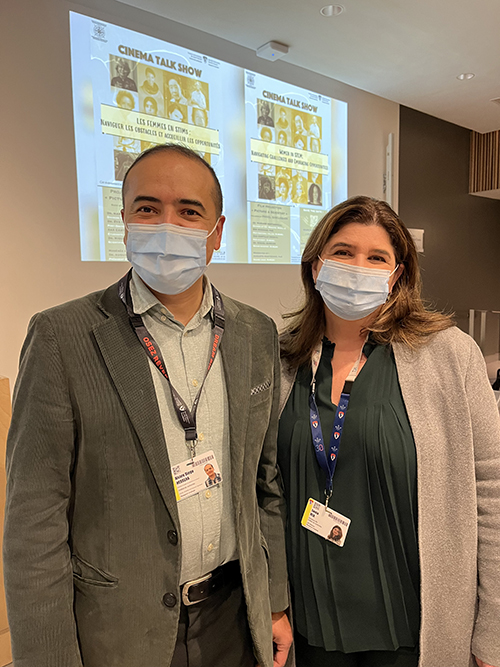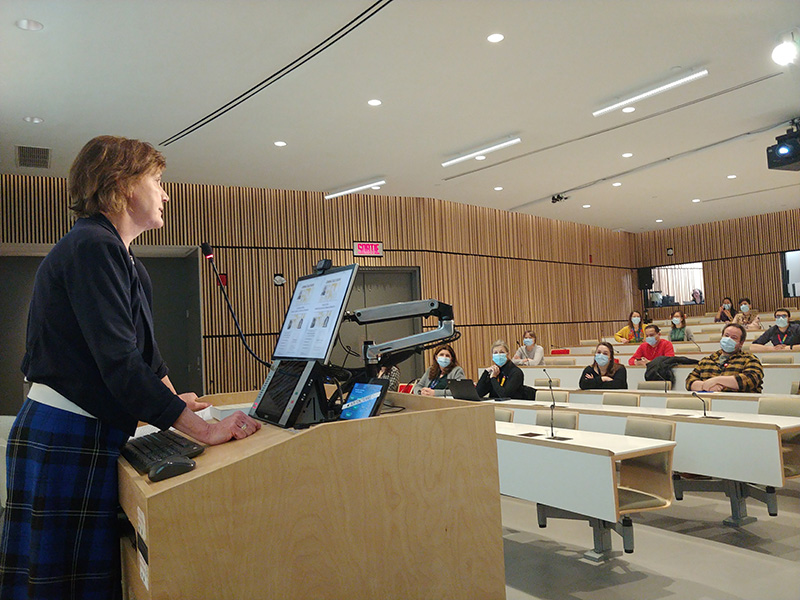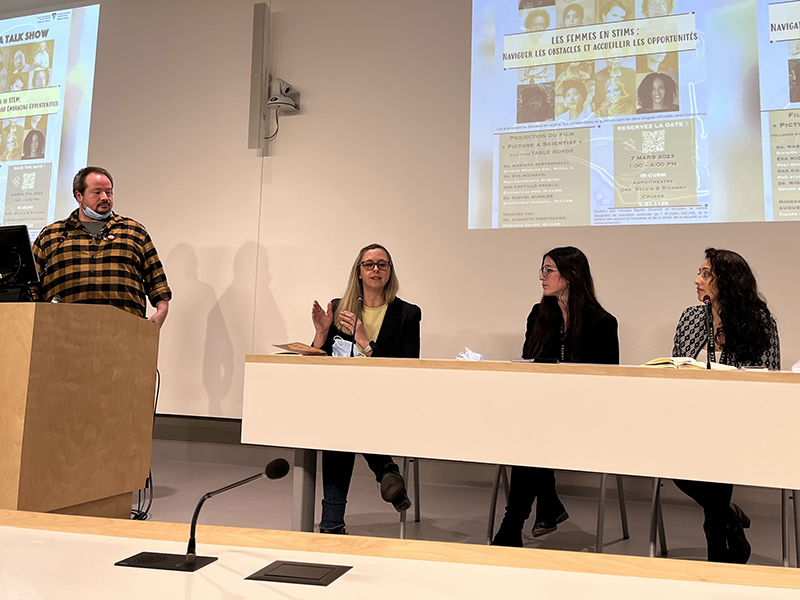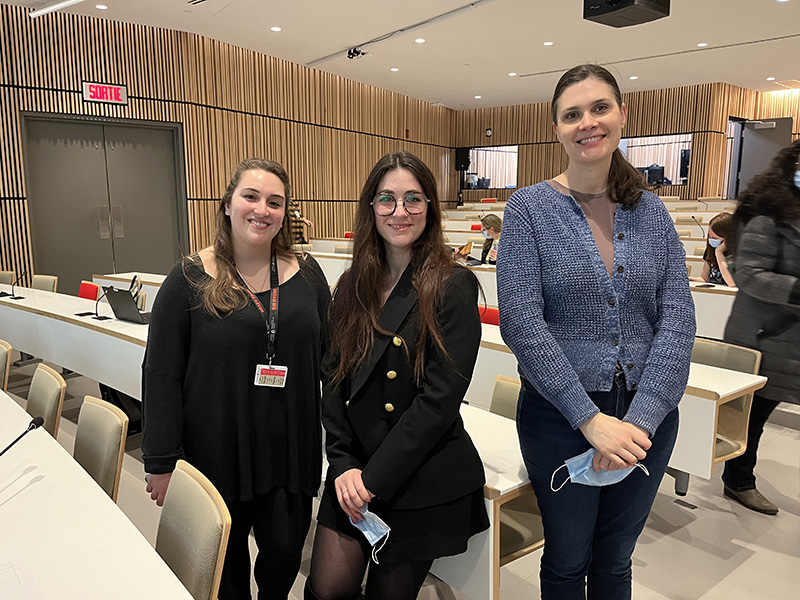
A panel of RI-MUHC women scientists and allies discuss the roles of women in science
To mark International Women’s Day, members of the Research Institute of the McGill University Health Centre (RI-MUHC) community gathered this week to watch and discuss the award-winning film Picture a Scientist. The 2020 documentary follows the lives of three female scientists: ecologist Nancy Hopkins, chemist Raychelle Burks and geologist Jane Willenbring. The filmmakers, Sharon Shattuck and Ian Cheney, examine the challenges faced by women scientists and present ways to improve their situation by showing the firsthand experiences of these women combined with statistical data.
Diego Herrera, PhD, opened the event before a keen in-person audience.

“It’s a powerful, emotional film that will give us a lot to reflect on this afternoon,” said Herrera, who is the RI-MUHC’s Equity, Diversity and Inclusion Specialist and principal organizer of the event.
“Although our current society takes gender equality for granted, injustices based in gender persist, and we want to understand their causes,” added Herrera. “We want to find possibilities for action in order to change this reality, especially here at the Research Institute of the McGill University Health Centre.”
Held in the Cruess Auditorium at the Glen site, the screening of the film was followed by words from Louise Pilote, MD, PhD, deputy director of the RI-MUHC and a senior scientist in the Cardiovascular Health Across the Lifespan (CHAL) Program.
Being able to talk openly
“Today’s event is about talking and being able to talk openly,” said Dr. Pilote. “That’s what the RI-MUHC wants to foster in our community, so that we can address problems like the MIT report. It took a long time, but when you talk about something, then you try to identify the root cause, then you can find the solution. It is the scientific method. (…) I encourage everyone to talk. It’s difficult, but we’re very serious at the RI-MUHC about making sure that everyone feels welcome and understood.”

After the introduction of a new sexual harassment training program by human resources counselor Danièle Doura, the afternoon culminated in a panel discussion with RI-MUHC scientists in different stages of their careers. The panelists included RI-MUHC associate investigator Mariane Bertagnolli, PhD, of the CHAL Program, postdoctoral fellow Éva Michaud, PhD, and doctoral student Ana Castillo Orozco. The event was moderated by research associate Augusto Montezano, PhD.
Discussion focused on the barriers faced by women in science and on finding ways to create more inclusive and sustainable work environments for women in research. The topics included inherent biases in the workplace, inappropriate power dynamics, the way that a culture of dependence inherent in research affects researchers from marginalized groups, ways in which voices can be amplified, and much more. The audience of about 50 participated with numerous questions and comments.
“By protecting women, we are protecting science.”
— Mariane Bertagnolli, PhD
“It’s important that we start discussing more intensely to find solutions and address the barriers that stand between us and these solutions,” said Bertagnolli. “We need to think in a more practical way and not expect that many, many women who have to work twenty [extra] hours a week for twenty years to get some results. We expect that this will happen fast and that we will have institutional support that won’t just count on us and our time, because what we want, at the end of the day, is to be scientists. By protecting women, we are protecting science.”

“To me, it’s the entire career that is made invisible,” said Michaud after sharing an anecdote concerning the way women are not always treated as equals in conference situations. She emphasized the importance of treating women as scientists, valuing the brain rather than focusing on the female body.
The panelists agreed that organizations must foster a culture of transparency and accountability in order to overcome biases and create safer spaces.
“The first person that feels that something happened has to speak out,” said Orozco. “It’s definitely not easy. A very simple example would be a symposium – the organizer has a big, big responsibility. If I’m receiving people in my house – old friends, new friends – it’s my responsibility to assure that everyone feels comfortable. The organizers really have to be aware that part of organizing something is to create and disseminate information if anything happens. We have to create a platform for people to speak out and feel comfortable.”
“Allyship starts by having these uncomfortable conversations.”
— Éva Michaud, PhD
“It’s important to note that it’s not an us-versus-them narrative,” added Michaud. “Allyship starts by having these uncomfortable conversations. If someone gives you feedback about something you did, you thank them, take it home with you and never cross that line again.”

In context of the RI-MUHC Equity, Diversity and Inclusion Action Plan, this event was jointly led by several groups and services at the RI-MUHC, including the Desjardins Centre for Advanced Training (DCAT), RI-MUHC Trainee Council, EArly and mid-CAreer REsearchers network (EACARE), and Human Resources and Environmental Health & Safety Division.
This event was possible thanks to the tremendous efforts of the organizing committee: Diego Herrera, PhD; Ruben Lopez Salazar, PhD; Augusto Montezano, PhD; Rayan Ben Letaifa; Julia Messina-Pacheco and Ariel De Roo.
Picture a Scientist is available for streaming on Netflix.
